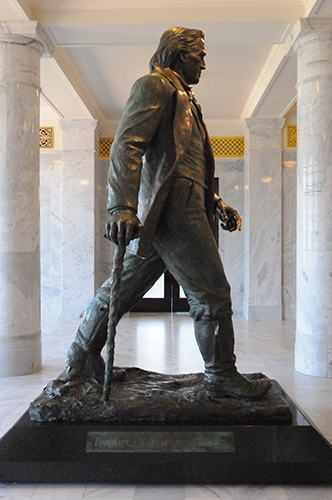Nothing Justifies the Racism of Brigham Young
I saw someone on Threads today posing a question about Brigham Young that upturned a trashcan in my head. Since I have frequent run-ins with folks on the racism of Brigham Young, I figure it was worth preserving here for future reference.
Question: What do you think motivated Brigham young's divergent choices on altering teachings regarding blacks and upholding polygamy? How do these decisions reflect the delicate balance between maintaining distinctiveness and fitting in with mainstream society?
I take issue with the question on a couple of fronts, not the least of which is the way people in LDS circles turn "blacks" into a noun, which makes my skin crawl every time I hear it. But also because it presupposes that the way Brigham Young viewed segregation and polygamy in the Church were fundamentally different from one another. They weren't. It also presupposes that social pressure was a significant factor in shaping Brigham Young's personal beliefs in relation to race. It wasn't.
Brigham Young was genuinely racist. The changes he made to race relations within the Church don't reflect the attitudes of others that were imposed upon him. They were his. He didn't cater to the institution of slavery out of convenience, for the sake of keeping the peace with Southern slavers who came to Utah. This is what the "State's rights" argument in Utah looks like, and it's a form of historical revisionism to which we can't give any degree of credibility or moral licensing.
Joseph Smith, for all his faults, didn't share in those
prejudices against Black people. He advocated for an end to slavery. He prophesied of the Civil War and the day when "slaves shall rise up against their masters," that slavery would bring about war that would envelope the entire earth, and that the blood of the Saints, including those who were formerly enslaved, would cry out to God and "be avenged of their enemies." (See D&C 87:4-7) Joseph Smith provided ordinances of the Church and ordination in the priesthood to black men. The most accurate way to explain the deviations from this vision is that Brigham Young did not share in it in any way. He failed to continue in the trajectory of Joseph Smith because he didn't want to or have to do so.
Young's descendants try to say he wasn't racist, that he was trying to "save" the Church. I've seen black historians take on "State's rights" apologists simply by contextualizing the argument in the form of a question: the State's rights to do what? Answer: to engage in slavery. Invoking that same logic, I challenge apologists for Brigham Young who state his support of segregation was to "save the Church." To save the Church from what? Answer: from black people and interracial marriage. That was Brigham Young's answer. The idea that black people and their presence in the Church posed a significant enough threat that Church leadership were justified in responding with segregationist policies? Ludicrous. The effort to maintain that Brigham Young's segregationist policies were motivated by something other than sincerely-held racist beliefs? Abhorrent.
Brigham Young supported white supremacy, and slavery by extension, because he believed they were divine institutions. And since he believed polygamy was also a divine institution, that is the common thread shared between them.
Any sacrifice can and must be made for what the prophet has decided, through the filter of his own beliefs, is a divine institution. And and all consequences, social or political, must be accepted in the observance and protection of those institutions. There's no conflict here in Brigham Young's mind. He's treating racism and polygamy exactly the same way: as a sincere believer who is unapologetic about his participation in what he believes are acts of God. To be ashamed of them, to him, is to be ashamed of God. To yield to any kind of pressure to abandon them is to fear man more than God.
Enslaving human beings didn't save the Church from anything. This is a myth that has no place among our people.
Everyone likes to speculate about the hypothetical harm that might have
been done had the racial restriction never existed. No one wants to own
the actual harm that existed to real people because of that restriction.
The former is imagined and without substance. The latter is real and
has real human lives and pain attached to it.
And I say this as someone who would've been caught in the net of the Church's racial restriction that was developed as an extension of Brigham Young's racism: I don't give a flying fig why he was racist. I care about the impact his racism had/has upon the Church.
By the standards of Brigham Young, which shaped the priesthood restriction as it came to be enforced, mine was an interracial marriage that should've never taken place. I deserved no temple blessings. I could exist among the Saints and look forward to, at best, an eternity of servitude. Every good thing I now recognize as an act of God in my life, the long list of divine blessings that make up and contribute to my personal faith, would never have been extended to me if it had been up to Brigham Young. To understand his motivations, you have to approach him from the perspective of the ones he rejected: a human being of flesh and blood, fully endowed with intelligence and feeling as real as any white person's, but at the same time (in his mind) not fully human. Brigham Young didn't see me, or black and mixed race people like me, as possessing any kind of humanity to which he owed any degree of dignity or respect.
That is his legacy. Those are the fruits by which I know him.
What can explain that?
Racism.
What justifies it?
Nothing.



